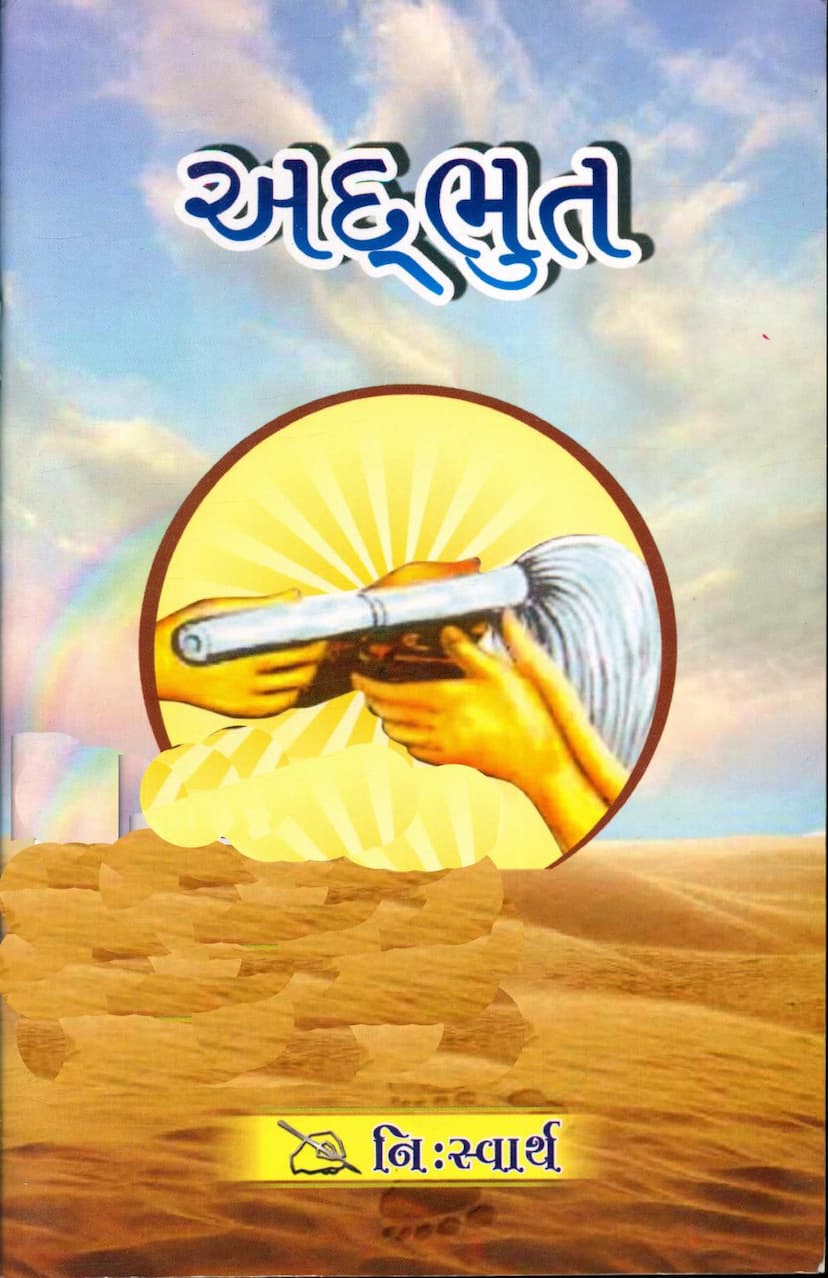Adbhut
Added to library: September 1, 2025

Summary
This Jain text, titled "Adbhut" (Miraculous/Wonderful) by Niswarth and published by Parmarth Pariwar, is a collection of spiritual discourses and life stories, primarily focusing on the life and teachings of Muniashri Tapoyashvijayji M.S. It aims to inspire readers towards spiritual growth and adherence to Jain principles.
The book begins by expressing gratitude and dedicating the work to Muniashri Tapoyashvijayji M.S. on his 14th deeksha (initiation) anniversary. The author(s) reflect on their own past lives, which were initially engrossed in Western lifestyles, but found direction and meaning through the guidance of learned Jain monks. They highlight Muniashri Tapoyashvijayji M.S.'s remarkable spiritual journey, marked by over 5000 fasts (upvas).
A significant portion of the book is dedicated to discussing the concept of "Aasannbhavi Punyanubandhi Punyavala Jivo" (souls with fortunate karmic predispositions that are about to bear fruit). This concept is explained through comparisons with ordinary children and youth who exhibit typical youthful impulsiveness, ego, and attachments. In contrast, those with "Aasannbhavi Punyanubandhi Punya" are described as being free from such age-related faults. They are naturally calm, serious, and possess an inherent inclination towards virtue, even from a young age. The text uses examples to illustrate how common human flaws like immaturity, pride, indulgence, and complaining in old age are absent in these fortunate souls.
The book then delves into the life of Ramanlal Parekh, later known as Muniashri Tapoyashvijayji M.S. His early life is portrayed as that of an active, fun-loving, and somewhat mischievous child from a village. The narrative details his childhood pranks, his love for nature, and his enjoyment of traditional games. A turning point in his life occurred when a new, religiously inclined headmaster introduced him to the concept of Jivdaya (compassion for living beings). This led Ramanlal to renounce the consumption of root vegetables, realizing the immense number of lives destroyed for their sake. He also embraced the practice of Paushadh (a day of fasting and religious observance), which left a lasting spiritual impression on him.
The text chronicles Ramanlal's journey to Ahmedabad for employment. Despite a modest salary, he balanced his work with religious observances, inspired by his uncle who had taken deeksha. He undertook significant fasts, including twenty-one fasts during a monsoon period, and his employer, Keshavlal Devchand, supported his spiritual pursuits.
The book emphasizes the importance of vivek (discretion) and control in all aspects of life, especially in consuming food. It contrasts the immoderate eating habits of ordinary individuals with the controlled and mindful approach of great souls. The narrative highlights how even in favorable circumstances, great souls maintain a balanced perspective, while others tend to indulge excessively.
The text praises Shalibhadra as an example of someone born with immense karmic fortune, receiving abundant material wealth but remaining detached from it. This is contrasted with the common tendency to overindulge when presented with luxuries.
The discourses also touch upon:
- The nature of human desires and attachments: The text criticizes the insatiable desire for material comforts and the lack of appreciation for spiritual pursuits.
- The importance of renunciation and detachment: It showcases how true happiness lies in detachment from worldly possessions and pleasures.
- The role of good company (Kalyanmitra): The book stresses the significance of associating with virtuous individuals who inspire spiritual growth.
- The essence of sincere devotion and practice: It highlights that true devotion is not about outward show but about inner commitment and consistent effort.
- The difficulty of obtaining a human birth and the Jain faith: The rarity of this precious existence is emphasized, urging readers to make the most of it.
A significant part of the book is dedicated to Muniashri Tapoyashvijayji M.S.'s spiritual practices and achievements after deeksha. It details his rigorous adherence to Jain tenets, his dedication to learning, and his unwavering commitment to his vows. Despite taking deeksha at the age of 70, he exhibited remarkable spiritual strength and devotion. His life is presented as a testament to the power of the Jain path. The text recounts his extensive reading, his ability to memorize scriptures, and his meticulous observance of rituals like Pratikraman (confession and repentance).
The narrative also includes anecdotes about his Shrāvikā (laywoman follower), highlighting her immense sacrifice, devotion, and support for his spiritual journey, even in difficult circumstances. Her selflessness and dedication are portrayed as an inspiration.
The book uses various analogies and stories, including the tale of Siddharaj Jaisingh, to illustrate the importance of earning a meaningful title through true merit and virtuous deeds rather than just association. It also draws parallels with modern-day examples to emphasize the contrast between worldly pursuits and spiritual aspirations.
Ultimately, "Adbhut" aims to awaken the reader's consciousness towards the preciousness of human life and the Jain dharma. It encourages them to cultivate spiritual discipline, detachment, and devotion, leading them towards ultimate liberation. The book concludes with a prayer for attaining the lotus feet of Lord Simandhar Swami and achieving eternal liberation.